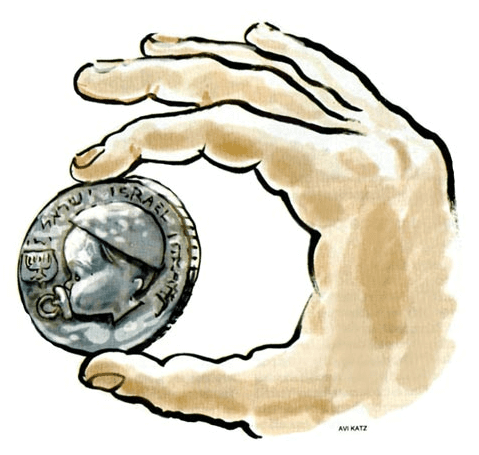Original Article Published On The Jerusalem Post
It started with a late-night call from DeeDee Benel, my son’s faculty adviser at Manhattan’s Ramaz High School, a private Orthodox Jewish prep school on the Upper East Side. “Everything is OK with Daniel,” she reassured my wife and then began telling her about the birth of her grandson in Denver, Colorado, and the upcoming pidyon haben.
This ceremony is performed for first-born Jewish males who, according to the Torah, belong to G-d and must be “redeemed” by their parents. Only those whose parents are not descendants of the Levites or Kohanim – members of the “priestly class” who cannot be redeemed – undergo the ritual, and only those who have been delivered naturally and not by C-section. It happens 31 days after birth; the father pays five silver coins to a kohen friend who passes them over the child’s head, “releasing” him from his duty to serve G-d as a priest in the Temple, and recites the priestly benediction, Birkat Kohanim. In Temple times, the priests kept the money, but nowadays the kohen tends to return the coins to the father as a nice gift for the child. It all culminates in a festive meal, usually a breakfast, after which everyone dashes off to work.
For the family, it’s a breeze compared to the stressful brit mila circumcision ceremony, when they have eight days to line up a mohel, and a caterer, notify friends, and there’s blood involved. But, nevertheless, Benel was anxious about her grandson’s pidyon haben. Noting that the book of Numbers specifies that the redemption price is “five shekalim of silver, which is 20 gerah,” she told my wife that she had gone on-line looking for the right coins. “I originally ordered coins from a religious man in Brooklyn. I thought they were pidyon haben coins. When they arrived at my home, they were simply U.S. silver dollars.” Halakhically acceptable, but not what Benel, a woman of uncompromising standards, had in mind.
The coins have to contain 100 to 117 grams of silver. Silver dollars minted before 1965 contain 24.06 grams of pure silver. Five of them would fit the bill for a pidyon haben (though more recently minted U.S. coins would not). But Benel wanted something special.
“I went on-line and Googled ‘pidyon haben coins,’” she explained. “The name of one place in Hamden, Connecticut, came up. I called the guy. It was late and he usually closes at 5pm. By a miracle, he was at his desk doing paperwork. I told him the story. And he had the coins I was looking for.” She was referring to a set of coins minted by the Bank of Israel in the 1970s for the specific purpose of pidyon haben. The set consists of five coins containing 117 grams of pure silver. The beautiful 25 lira coins have a small Hebrew mem mint mark and the emblem of the State of Israel on one side and the biblical verse for pidyon haben and five pomegranates on the other.
The coin dealer offered to send the coins overnight mail to Denver. But it was winter and Benel was concerned about the weather. She wanted to personally deliver the coins to her son – the father of the new born boy – who was visiting New York and would be flying back to Denver for the ceremony in two days.
“The delivery of the coins can’t be delayed,” she implored before coming to the point of her call: “I remembered that I had a student from New Haven [Connecticut] … That’s why I’m calling… I didn’t want to ask, but….” Hamden is actually 10 or 15 minutes from our home. “Your friend is a bit nuts, the dealer observes when I arrive at his office the next morning, filling me in on the nonstop series of late-night calls and messages from the irrepressible Benel.
We chat amicably about the price of gold, and he tells me that many people are melting down coins for money and he shows me a table filled with new commemorative gold coins, featuring Shmuel Yosef Agnon and selling for $800 each. “I didn’t even know who Agnon was until I came across these coins and researched the guy,” he tells me.
The dealer (who wishes to remain anonymous, for reasons of safety and security) reaches across his desk for a sturdy blue box, tucked safely inside a Fed Ex envelope.
“Here are the coins for your friend,” he says and, shaking his head, adds: “I’m not a rabbi, but she shouldn’t be buying them. It is the father’s obligation. Besides, five silver dollars would do the job – she could have saved nearly $150.”
Not the sort of argument that would sway a determined Jewish grandmother like DeeDee Benel. And I was glad that I could do my small part to help her get this ancient Jewish ritual just right.
